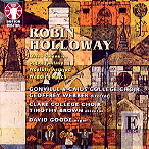British composer Robin Holloway (b. 1943), a lecturer at Cambridge University for the past 30 years, writes some of the thorniest, craggiest, noisiest (especially whenever there’s an organ involved) music you’ll ever hear performed by a choir, particularly in the context of sacred or otherwise religious-themed material. Perhaps it has something to do with the fact that he’s “a practicing Nietzschean” (a point he for some reason feels compelled to make right at the beginning of his liner notes, where he rather ingraciously apologizes for having been “soused” with “a powerful sludge” of church music tradition before “the age of consent, knowledge, or taste”), but throughout his Missa Caiensis we hear what seems to be not worshipful utterances but an antagonistic wrestling with texts and a fight with the inherently celebratory nature of the mass, the sharply angular melodic lines and dissonant harmonies creating a disturbed, unsettled atmosphere, the busy, swirling organ often sounding as if it’s playing a different piece–or is on a page different from the choir.
In light of Holloway’s denial of Christian faith you have to wonder why bother to engage in writing a mass. Holloway’s answer: the “challenge to one’s craft”, which is where he puts his faith. Of course, it’s far from the first time that an areligious composer directed his creative powers in such an enterprise–and listeners (Nietzschean and otherwise) will have to decide whether in Holloway’s case it was successful, and on what level. To my ears, and regardless of the composer’s personal philosophy, what we have in this mass is a cold, often shrill rant, a fussy intellectual exercise of one trying desperately to remain emotionally detached from his subject. Even if you regard it as a purely concert-oriented work (and it was originally written for liturgical use), the language and syntax are so relentlessly similar throughout, with few anchoring points or clues to the texts’ meaning, it’s nearly impossible to tell one section of the mass from another, and thus we’re looking for the exits long before the concluding “dona nobis pacem”.
When Holloway seriously addresses the question of emotion–which he admits is unavoidable in dealing with the text of the ancient anonymous poem Woefully Arrayed–he simply cranks up the harsh harmonies, obliterates any sense of time and tonality, mocks all concept of melodic coherence, and gives us 11-and-a-half minutes of torturous, meandering cacophony. You might say this is appropriate, given the poem’s powerful, vivid, gruesome, and very affecting imagery of the crucified Christ’s agonized thoughts–but this doesn’t make the listening any more compelling or rewarding.
The Organ Fantasy must be a smashing good time for the organist–what organ virtuoso worthy of the name wouldn’t love to get hands and feet into this monster (nearly 27 minutes!), a formidable tour de force that not only challenges the physical stamina and technical mastery of the performer but will put a few chinks in your ceiling plaster as well. Organist David Goode certainly pulls it off with impressive style, and the engineers put us right there with him in the glorious space of England’s Ely Cathedral. Needless to say, both choirs are absolutely to be commended for their tenacity in learning this music and for their enthusiastic, dynamic, world-class performances. You’ll know if you want to give this a try.
































